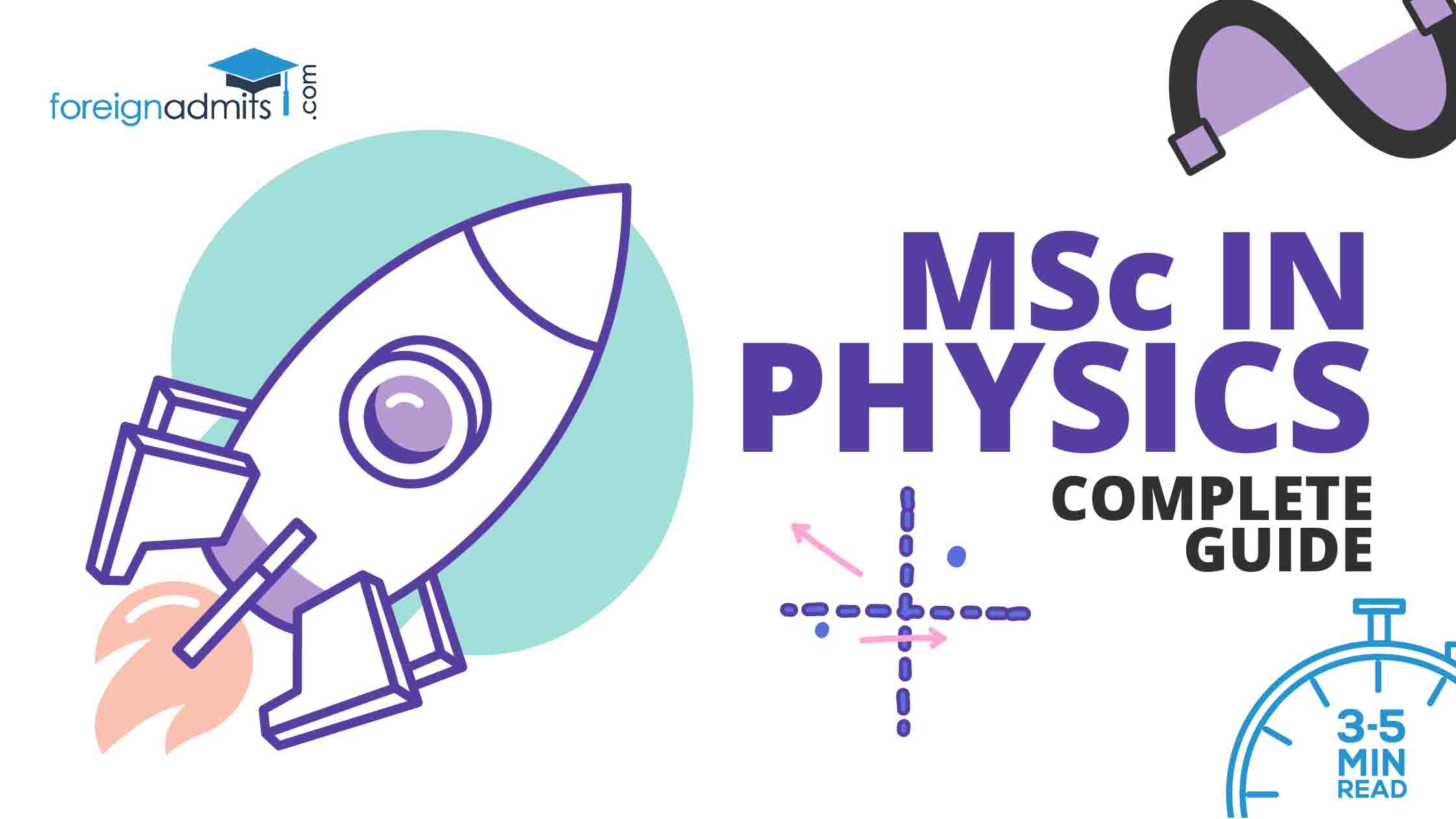Physics is the most crucial part of science. It is the study of matter and its interactions in the universe. Physics studies objects’ behavior under forces, the nature of gravitational, electromagnetic, and nuclear fields. Physics is a composition of various subjects such as astronomy, mechanics, engineering, physical sciences, geology, etc. After getting an MSc in Physics, you can opt for any of these fields to continue your further studies and research. MSc in physics is a two-year full-time course in India. Additionally, this course is best for students who have a curious nature and want to explore their numerical and scientific skills. Further, the student should possess analytical thinking, laboratory skills, logic, and reasoning with excellent verbal communication.
[widgets_on_pages id=”Masters”]
About MSc in Physics
MSc in Physics is a comprehensive course that aims to educate students about physics in daily life. Also, it is the main application in research and technology. Additionally, this course is also available in distance mode. However, the eligibility criteria for MSc in Physics with distance mode are the same as those of the master’s in traditional ways. The only difference lies in the fees that are INR 10,000 to INR 60,000 in distance mode, whereas the costs for the master of science in physics in regular college is INR INE 20,000 to INR 4.5 lakh.
Also read: Masters in Quantum Computing.
Eligibility criteria for MSc in Physics
The minimum eligibility criteria that students should meet for admission into the Masters of Science in Physics are below:
The candidate should hold a Bachelor of Science degree (preferably in Physics). However, some institutes like Delhi university grant admission to graduates with a Bachelor of Science in Electronics, Mathematics, and Engineering graduates.
Minimum marks obtained in BSc in Physics shouldn’t be below 55% (acceptable in most colleges). However, for admission into a top college, you should score above 90%.
Masters in Mass Communication.
Syllabus of MSc in Physics
The curriculum break-down comprises three main parts: theory, practical work, and academic research. Additionally, the course is taught through lectures, seminars, laboratory work or experiments, and workshops. The semester-wise syllabus is:
Semester I
- Fundamentals of MATLAB
- Mathematical methods
- Quantum mechanics
- Solid-state physics
- Classical mechanics
- Electronics
- Molecular spectroscopy
- Atomic spectroscopy
- Lab work
Semester II
- Astrophysics
- Group theory
- Statistical mechanics
- Advanced optics
- Classical electrodynamics
- Relativity and cosmology
- Nuclear physics
- Advanced quantum mechanics
- Renewable energy sources
- Lab work
Semester III
- Specialisation subjects
- Dissertation or thesis part I
Semester IV
- Specialisation subjects
- Dissertation or thesis part II
Some books recommended for MSc in Physics are:
- Fundamentals of Molecular Spectroscopy by C N Banwell
- Introduction to Solid-State Physics by Charles Kittel
- Modern Quantum Mechanics by J J Sakurai
- Solid-state physics, devices, and electronics by K Vijaya Kumar and T Srikanth
- Electricity and Magnetism by James Clerk Maxwell
Top colleges
Here is a list of some top colleges in India for an MSc in Physics.
- University of Delhi, New Delhi
- Indian Institute of Technology, New Delhi
- Jawaharlal Institute of Postgraduate Medical Education and Research, Puducherry
- Indian Institute of Technology, Mumbai
- Christian Medical College, Vellore
- Indian Institute of Technology, Kharagpur
- Guru Gobind Singh Indraprastha University, Delhi
- Indian Institute of Technology, Kanpur
- University of Hyderabad, Hyderabad
- Indian Institute of Technology, Chennai
Meanwhile, here is a list of some top institutes abroad for aspirants who want to earn an international master’s degree.
- Imperial College of London, England
- The University of Manchester, England
- University of Alberta, Edmonton, Canada
- McGill University, Montreal, Canada
- RWTH Aachen University, Aachen, Germany
- The University of Melbourne, Melbourne, Australia
- The Australian National University, Canberra, Australia
- University of California, Berkeley
Scope and Job prospects
First and foremost, after getting your master’s degree, you can opt for higher education or research and pursue a doctorate degree from a reputed university. Also, you can enter the job field or industry with MSc in Physics. However, the student should possess complete knowledge of laboratory practices and theories and a good percentage in academics. Additionally, there are several job responsibilities and requirements that only students with good communication, leadership, teamwork, curiosity, accuracy in the lab, analytical thinking, etc. can fulfil.
Postgraduate candidates can apply to both public and private sector institutes for the various job roles mentioned here:
- Research fellow
- Medical physicist
- Research Scientist
- Radiation physicist
- Research associate
- Lab assistant
- Assistant professor
- Lecturer
- Physicist
- Subject expert
The average salary of candidates as freshers will be approximately INR 4 lakh to INR 7 lakh per annum. Further, the highest-paid job is that of a research scientist with a salary of INR 10 lakh per annum. However, you must know that the job is draining and requires constant efforts from your side to keep going further.
[widgets_on_pages id=”Masters”]
Fun fact: Hyderabad city saw the highest hike in the salary of analytical professionals that is 25%. The scope of the research and development sector is really high. The top recruiters are:
- Infosys
- Tech Mahindra
- Wipro
- CTS
- Maruti Udyog
- Bharat Heavy Electricals Limited (BHEL)
- Indian Space Research Organisation (ISRO)
- Bhabha Atomic Research Centre (BARC)
Conclusion
In conclusion, there are many opportunities for graduates and postgraduates in Physics. The related jobs demand a tremendous amount of skill and focus, making it difficult for anyone to pursue. Thus, move forward with the subject only if you think you are genuinely interested in the subject and dedicate a lot of time and energy. For detailed information and counselling, contact us by clicking here.
